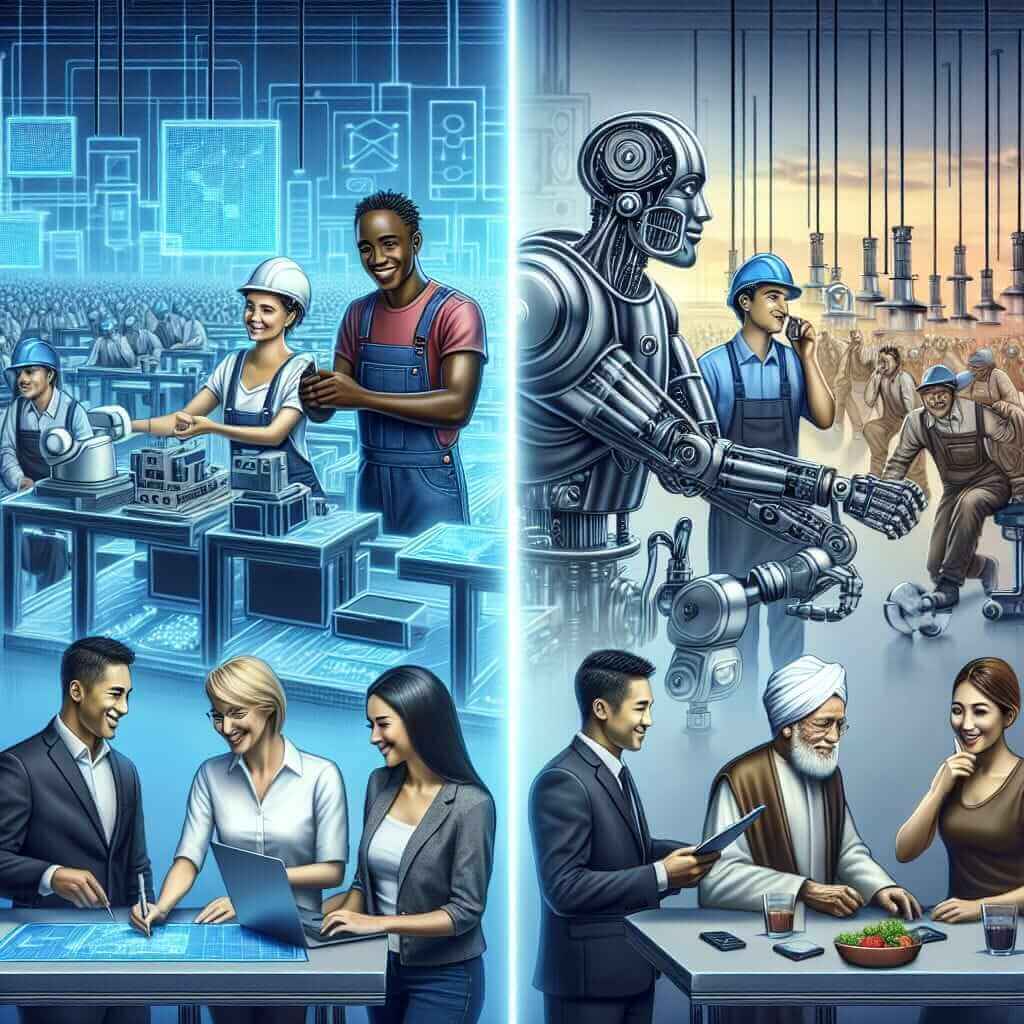The IELTS Reading section is designed to assess your ability to understand and interpret complex texts. This section is known for its diverse topics, and one recurrent theme is the impact of technological advancements, including automation, on society. Given the rapid advancements in technology and its profound implications on the workplace, it’s not surprising that this topic frequently appears in IELTS exams.
In this article, we will delve into “Social Implications of Automation in the Workplace” by creating an IELTS-style reading passage and related questions. This will not only help you practice but also provide insight into potential areas for future examinations.
Practice Reading Passage: Social Implications of Automation in the Workplace
Automation in the Workplace: A Double-Edged Sword
Automation, driven by advances in artificial intelligence (AI) and machine learning, is revolutionizing the workplace. This transformation brings both opportunities and challenges. For employees, automation can mean either the risk of redundancy or liberation from repetitive tasks, allowing them to focus on more creative and strategic functions.
Economic Impacts
The economic implications of workplace automation are significant. On one hand, businesses can benefit from reduced labor costs and increased efficiency. For instance, automated manufacturing processes have significantly lowered production costs, making goods cheaper for consumers. Additionally, automation can lead to the creation of new job categories that require advanced technical skills.
However, the flip side includes the displacement of workers who perform routine tasks. According to a report by the World Economic Forum, approximately 85 million jobs may be displaced by machines by 2025. Conversely, 97 million new roles may emerge that are more adapted to the new division of labour between humans, machines, and algorithms.
Social Implications
The social implications of automation are multifaceted. The displacement of jobs can lead to increased unemployment rates, particularly among low-skilled workers. This scenario can exacerbate social inequalities and create economic polarisation. Communities reliant on industries such as manufacturing may experience significant socio-economic downturns.

Moreover, there are implications for the work-life balance. With repetitive tasks being automated, employees can potentially enjoy a more flexible work schedule. However, the pressure to continuously reskill and adapt to new technologies can also lead to increased stress and job insecurity.
Ethical Considerations
Ethical considerations are also paramount. The use of AI and automation in the workplace raises questions about privacy, surveillance, and the moral responsibility of businesses. Ethical AI guidelines suggest that transparency and fairness should be integral to the deployment of automation technologies. Moreover, ensuring that workers are treated fairly and their data is protected is crucial in maintaining trust and ethical standards.
Questions
Multiple Choice
1. What is one potential positive economic impact of automation mentioned in the passage?
A. Increased unemployment rates
B. Reduced labor costs for businesses
C. Higher production costs
D. Decreased efficiency in manufacturing
2. According to the passage, how many new job roles may be created by 2025 due to automation?
A. 85 million
B. 97 million
C. 75 million
D. 100 million
True/False/Not Given
3. The passage states that automation will eliminate more jobs than it creates.
A. True
B. False
C. Not Given
4. Ethical AI guidelines recommend maintaining transparency and fairness in automation technology deployment.
A. True
B. False
C. Not Given
Summary Completion
Complete the summary below using words from the passage.
Automation in the workplace can result in lower __ (5) costs and greater efficiency. However, it may also lead to job (6) and increased social inequalities. The ethical use of AI and automation requires ensuring ____ (7) and fairness.
Answer Key and Explanations
Multiple Choice
-
B. Reduced labor costs for businesses
- Explanation: The passage states that one of the economic benefits of automation is reduced labor costs for businesses.
-
B. 97 million
- Explanation: The passage indicates that 97 million new roles may emerge due to automation by 2025.
True/False/Not Given
-
B. False
- Explanation: The passage does not state that automation will eliminate more jobs than it creates; it actually mentions that 97 million new roles may emerge, outnumbering the 85 million jobs at risk.
-
A. True
- Explanation: The passage notes that ethical AI guidelines advocate for transparency and fairness in the deployment of automation technologies.
Summary Completion
- labor
- displacement
- transparency
Common Mistakes and Tips
- Not understanding the question types: Familiarize yourself with different question types such as True/False/Not Given and Multiple Choice to avoid confusion during the test.
- Overlooking Keywords: Always look for keywords in the passage and the questions. They help in finding the correct answers more efficiently.
- Time Management: Practice managing your time effectively. Spend no more than 20 minutes per section to ensure you can complete all questions.
Vocabulary
- Redundancy (n.) /rɪˈdʌndənsi/ – the state of no longer being in employment because there is no more work available.
- Efficiency (n.) /ɪˈfɪʃənsi/ – the ability to accomplish a job with a minimum expenditure of time and effort.
- Polarisation (n.) /ˌpoʊlərɪˈzeɪʃən/ – the act of dividing or being divided into two sharply contrasting groups.
Grammar Focus
Subordinate Clauses
- Definition: A subordinate clause cannot stand alone as a sentence and depends on a main clause to make sense.
- Example: “Although automation reduces labour costs, it may also lead to job displacement.”
- Formula: Subordinating conjunction + subject + verb (incomplete thought).
Conclusion
Practicing IELTS Reading with passages related to current and pertinent topics like automation in the workplace can significantly enhance your reading skills. Always remember to understand the question types and manage your time effectively. For further reading practice and to explore related themes, you might find these articles informative: Social Implications of Artificial Intelligence on Human Relationships, Impact of Automation on Employment.